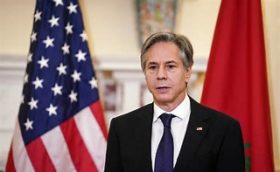Christian groups, a U.S. government panel and former senior U.S. diplomats are furious over Secretary of State Antony Blinken’s decision to take Nigeria off a list of countries accused of engaging in or tolerating religious persecution.
Blinken’s decision was revealed last week just before he visited Nigeria, Africa’s most populous country and one where Muslim-Christian tensions have long flared.
State Department officials gave no reason for the move other than saying Blinken, upon the advice of various department sections, decided Nigeria didn’t meet the legal threshold to be named as “country of particular concern” in an annual religious freedom list released by the secretary of state. They denied the decision’s unveiling was linked to Blinken’s trip but couldn’t fully explain the timeline.
Critics, however, are calling Blinken’s move political, designed to appease an important African partner. One former diplomat called it the “revenge of the bureaucracy” at the State Department. Others questioned how it fits with the Biden administration’s claim that human rights lie at the centre of its foreign policy.
The decision is likely to enhance worries among conservatives, including many evangelical Christians, that the Biden administration — unlike the Trump administration — will de-emphasize the plight of Christians persecuted overseas.
“It’s a victory for the terrorists — it’s a defeat for anyone concerned with human rights and religious freedom,” Frank Wolf, a former GOP congressman, said about Blinken’s decision. Wolf spearheaded some of the key legislation requiring administrations to name religious freedom violators; one of the laws is named after him.
The United States sees Nigeria as a key partner in the fight against terrorist groups such as Boko Haram and the Islamic State. Nigeria also is a major economic and political player on the African continent, which has suffered a string of coups and other instability in recent months.
But the issue of religious freedom in Nigeria is complicated. The country of 200 million is roughly evenly split between Christians and Muslims, and the tensions between the two communities are often multifaceted. They may include disputes over land and cattle grazing rights, for example, or tribal differences.
In recent years, however, the rise of Islamist terrorist organizations in Nigeria has meant religion is a greater factor, some activists say. Some also point to the use of courts that rely on Islamic law as a challenge. Much further stress that Muslims — especially moderate ones — also face growing threats in Nigeria.
It’s difficult to nail down exact statistics on religiously motivated violence facing Christians or other faith groups in Nigeria, but the number of Nigerians who have died directly or indirectly due to Islamist fueled conflict runs into the hundreds of thousands, according to the United Nations. And there are frequent reports of attacks on houses of worship, religious leaders and others.
The U.S. Commission on International Religious Freedom (USCIRF), a bipartisan panel, has since 2009 recommended that the State Department designate Nigeria as a “country of particular concern” on religious freedom. In 2020, Secretary of State Mike Pompeo finally did so, earning the panel’s praise.
A USCIRF report on Nigeria from earlier this year gave an array of examples of what appears to be faith-driven violence. Among them: the 2020 abduction and execution of Rev. Lawan Andimi by Boko Haram fighters.
In a news release last week, USCIRF said it was “appalled” and “especially displeased” at Blinken’s reversal on Nigeria. “We urge the State Department to reconsider its designations based on facts presented in its own reporting,” USCIRF Chair Nadine Maenza said in a statement.
The laws that govern the secretary of State’s decision say governments can be labelled as being of “particular concern” or be put on a “special watch list” if they “engaged in or tolerated” severe violations of religious freedom.
After “a good discussion within the department,” it was decided that Nigeria did not meet the criteria for any of the designations of concern, a State official said. The official declined to say which department divisions took what side in the internal discussions, but stressed that the ultimate conclusion didn’t mean that U.S. diplomats wouldn’t keep raising issues of human rights in Nigeria.
Politico
